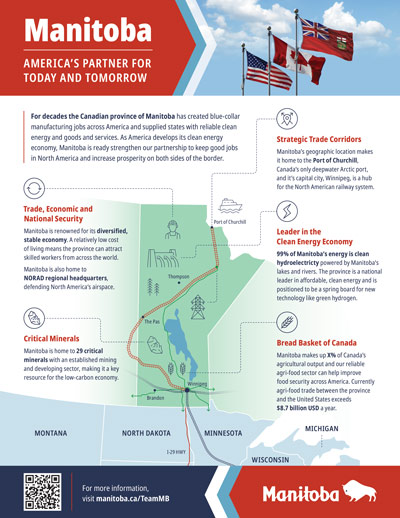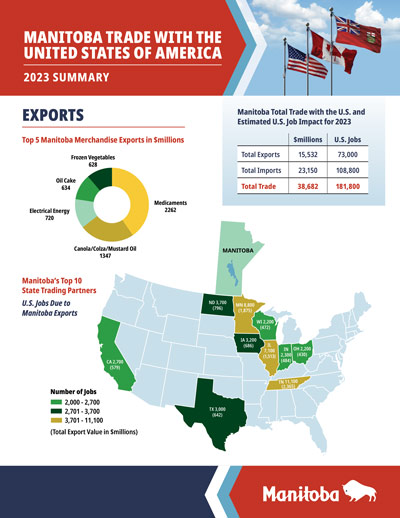Prairie Prosperity: Manitoba's Economic Future
Manitoba is a land of economic and cultural diversity, a place where natural resources are plentiful and the people have created a rich and vibrant society in the heart of North America.
Located at the centre of Canada, Manitoba is home to a population of 1.44 million. With a real GDP of $68.4 billion in 2022, Manitoba maintains a stable and diverse economy that includes a strong manufacturing sector, with robust clusters in aerospace, agribusiness and lifesciences, and exciting growth opportunities in critical minerals and the green economy.
Manitoba Advantages
Manitoba is an attractive place for businesses to invest and grow in Canada. With competitive business costs, a central transportation hub, a skilled workforce and a diverse economy, Manitoba offers opportunities for companies who are expanding to the North American market. Straddling the Prairies and the Canadian Shield, Manitoba is endowed with plentiful land, water, mineral and forestry resources, and strategic shipping access.
Businesses here enjoy very competitive costs for industrial space, labour, utilities and more. This is augmented with generous tax credits for research and development, and for manufacturing investment.
Manitoba offers many advantages to businesses who are looking to establish operations in North America, including reasonable rent and land purchase prices, very competitive electricity prices and an affordable cost of living. For example, the price of `Class A' commercial rental space in Winnipeg averages $19.37/sq. ft. versus $40.15 in Vancouver; $28.76 in Toronto and $22.24 in Montreal. Additionally, industrial electricity rates in Manitoba are among the lowest in North America, with the added advantage of being 99.7% clean and renewable, the greenest in Canada.
Multinational corporations located here include Price Industries, NFI Group, James Richardson & Sons, Simplot Canada, Canada Life Assurance, Boeing Canada, Ubisoft, Skip the Dishes, Pfizer Canada, 3M Canada, Cargill Canada, Wawanesa Mutual Insurance, StandardAero, and many others.
Manitoba is a multi-modal transportation hub, with shipping capabilities via air, rail, road and sea. At the geographical centre of Canada, our capital city, Winnipeg, is a main transportation centre between Vancouver and Toronto, as well as a major node for shipping to the U.S., with three direct rail connections to the US.
Manitoba is home to CentrePort Canada - North America's largest tri-modal inland port, offering opportunities for distribution centres, warehousing and manufacturing or processing facilities. With well-established trade routes, Manitoba facilitates the movement of goods, connecting rail networks to major ports such as Vancouver and Montreal, extending southward to the Gulf and the Pacific coasts of Mexico. Recent developments at CentrePort Canada and the Port of Churchill advance the province's shipping capabilities with a planned trade corridor from the Arctic to Mexico- serving destinations in North America and overseas.
With over one eighth of Canada's Indigenous population calling Manitoba home, the province is focused on continued economic reconciliation opportunities and recently created a dedicated Indigenous Economic Development department to support Indigenous-led businesses and economic development opportunities in the province. Examples of transformative Indigenous-led projects underway include a number of business partnerships in natural resource projects throughout the province and two significant mixed-use developments. Wehwehneh Bagahkinahgohn is the redevelopment of the Hudson's Bay building in downtown Winnipeg, and Naawi-Oodena is a 64-acre site to be developed by a partnership of seven First Nations.
The recruitment and retention of a highly skilled workforce is top of mind for employers globally. Approximately half of the working-age population in Manitoba has post-secondary education. As well, investments in workforce development, post-secondary education, and immigration. Manitoba has eight post-secondary institutions across the province that offer a wide range of programming to meet the needs of Manitoba employers. Complementing locally trained employees, our Provincial Nominee Program has been extremely successful in bringing internationally trained and skilled immigrants to Manitoba.
Manitoba Diverse Economy
Multiple industries thrive in our province. Major industry clusters include the following:
Manitoba's advanced manufacturing sector continues to attract new investments to the province. Areas of particular interest and strength can be seen in our Aerospace, and Heavy Vehicle and Equipment clusters. Major multi-national corporations such as Boeing Canada and NFI Group house large manufacturing facilities in Manitoba, citing the strength and consistency of the workforce in Manitoba as key reasons they continue to grow their facilities here. Opportunities for increased manufacturing growth continue to be of interest to Manitoba.
This cluster is diverse and includes grain production, agri-food processing, ag-machinery manufacturing and agricultural biotechnology. With a variety of agricultural crops harvested in the region, there is ample opportunity to increase the value-added processing of these inputs within the province. Roquette's relatively recent establishment of the world's largest pea protein facility, in Manitoba, demonstrates the scale of advanced processing opportunities available here. These opportunities are underpinned by the diversity of our agricultural production, by well-established industrial research and product development capabilities, and a robust business environment.
Manitoba is the second largest province for pharmaceutical and medicine production in Canada, with $5.4 billion in exports in 2022. This cluster has seen significant growth over the past five years, with research and development investments increasing by 46%; total capital raised increasing by 40%; and exports increasing by an impressive 170%. As the local ecosystem continues to innovate and grow, there will be increased opportunities in medical technology advancements and additional investments in pharmaceuticals and nutraceuticals.
Manitoba is home to 29 of the 31 minerals on Canada's 2021 Critical Minerals List, including lithium, graphite, copper, and silica. With active extraction operations for copper and nickel, and significant lithium exploration in process, the province holds numerous mining opportunities. These minerals hold significant economic value and strategic importance, putting Manitoba in a position to make a substantial contribution towards Canada's green energy transition in a sustainable and responsible way.
Manitoba is well-positioned to capitalize on the opportunities of the green economy with its abundant, environmentally stable hydroelectricity capacity. Additionally, the province is seeing the emergence of a number of innovative cleantech companies.




